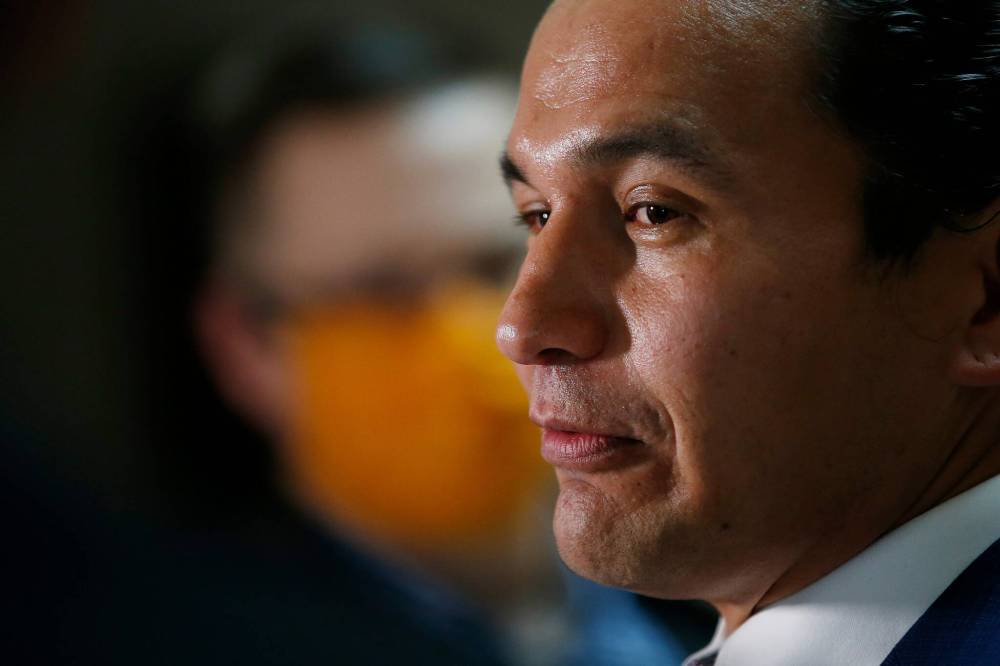The Tories and NDP both criticize the use of omnibus budget bills when they’re in opposition. But once in government, both political parties are guilty of using the process to ram through legislation without public input.
The fall sitting of the Manitoba legislature, which began this week, is no different.
The Kinew government introduced Bill 37 — the Budget Implementation and Tax Statutes Amendment Act 2024 — in May. It’s expected to pass in the coming weeks.

John Woods / THE CANADIAN PRESS FILES
Manitoba Premier Wab Kinew’s NDP government introduced Bill 37 in May, an omnibus budget bill which includes a long list of legislative changes that have nothing to do with the budget.
BITSA bills typically propose changes to tax laws and other statutes to implement parts of a provincial budget. Increasingly, though, governments have been adding non-budgetary items to them — often controversial ones — to avoid the scrutiny most bills undergo during the legislative process.
In Manitoba, all bills — except financial ones — must go to a standing committee where members of the public can provide input. It’s not unusual to have dozens of people and/or interest groups make presentations on proposed legislation. Some controversial bills can attract 100 presenters or more at public hearings.
To avoid that scrutiny, it’s now common for governments to add controversial legislative changes to BITSA bills.
That’s what the NDP government is doing with Bill 37, which includes a long list of legislative changes that have nothing to do with the budget, including labour law amendments, environmental law changes and increases to candidates’ election expense limits.
“(The NDP) took it upon themselves to take nine pieces of legislation and drop them into schedules in the BITSA bill,” interim PC leader Wayne Ewasko said Tuesday. “It’s undemocratic, because it takes the voices of Manitobans away.”
He’s not wrong. Changes to labour laws, elections financing rules or any other non-budgetary item should be made in separate bills so each can be assessed individually, scrutinized at standing committees and voted on separately.
Dumping them into BITSA bills, where the public doesn’t have a say on them and where MLAs are forced to vote on myriad legislative changes in a single piece of legislation, is wrong. That’s not how laws should be made. The public deserves better and should have input.
However, the Tories don’t have a leg to stand on when it comes to omnibus budget bills; they did the same thing when they were in government from 2016 to 2023. And the NDP did it before that when it was in power from 1999 to 2016.
Now it’s happening again. Both parties slam the practice while in opposition, but do it again when back in government.
If both political parties were serious about making the legislative process more democratic, they would change house rules and require that all bills go to a standing committee, including public hearings, before they become law.
There is no reason financial bills, including budget implementation ones, can’t be subject to that level of scrutiny. In fact, they should be. The public should have the ability to provide input into any aspect of a provincial budget, the same way they do for other bills.
If financial bills were required to go to a standing committee for review, there would be little, if any, advantage to adding non-budget items to BITSA bills. They would be subject to public hearings like all other pieces of proposed legislation and government would be unable to hide controversial legislative changes in them.
There’s nothing stopping government from referring a BITSA bill to a standing committee now and allowing the public to provide input on it. It’s allowed under house rules, but it’s not required. It’s discretionary. So governments almost always choose to avoid that step.
Instead of complaining about the use of budget omnibus bills, MLAs should be proposing that all bills go to a standing committee for review. That change would have to go through the normal process the legislative assembly uses to amend house rules, but it could be done.
If politicians wonder why the public seems to be increasingly skeptical about politics, this is a good example. Hiding non-budget items in budget implementation bills shows contempt for for taxpayers; it says loudly and clearly that government doesn’t want their input.
There are good reasons why bills go to standing committees in Manitoba. It not only allows MLAs to properly review them, it can lead to constructive amendments. The public can sometimes identify aspects of proposed legislation that government may have missed. It’s called democracy, which there seems to be less of these days.
tom.brodbeck@freepress.mb.ca

Tom Brodbeck
Columnist
Tom Brodbeck is a columnist with the Free Press and has over 30 years experience in print media. He joined the Free Press in 2019. Born and raised in Montreal, Tom graduated from the University of Manitoba in 1993 with a Bachelor of Arts degree in economics and commerce. Read more about Tom.
Tom provides commentary and analysis on political and related issues at the municipal, provincial and federal level. His columns are built on research and coverage of local events. The Free Press’s editing team reviews Tom’s columns before they are posted online or published in print – part of the Free Press’s tradition, since 1872, of producing reliable independent journalism. Read more about Free Press’s history and mandate, and learn how our newsroom operates.
Our newsroom depends on a growing audience of readers to power our journalism. If you are not a paid reader, please consider becoming a subscriber.
Our newsroom depends on its audience of readers to power our journalism. Thank you for your support.